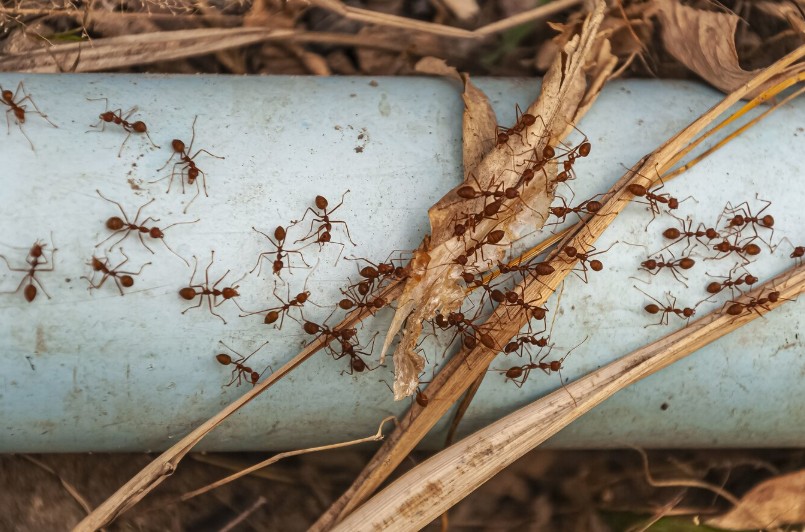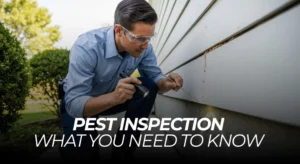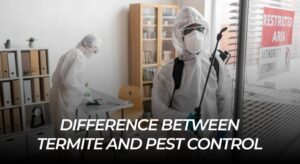Nothing can strike fear in the hearts of homeowners more than a plague of pests, and Floridians know this all too well. With a hot climate, full vegetation, and much humidity, the state of Florida is the perfect home to small creatures such as ants, cockroaches, mice, termites, and mosquitoes. However, while the climate in the state may establish the scene, homeowners may inadvertently invite the pests into their homes.
Top Mistakes That Attract Pests in Florida
This blog exposes the top mistakes Florida homeowners make that attract pests. Avoiding such mistakes will safeguard your home and make it less desirable to these unfriendly visitors.

Mistake 1: Leaving Food and Trash Accessible
Florida pests are opportunists, and easy access to food arouses their greed. Homeowners frequently overlook how tiny crumbs or pantry items that have not been stored in a certain way can draw in pests such as ants, cockroaches, or rodents. Non-security garbage bins that are not appropriately sealed can also serve as buffets for insects, raccoons, and even squirrels.
To prevent this error, keep all food in airtight containers, clean spills immediately as they occur, and take out the trash regularly. Garbage bins should have lids that are firmly seal to ensure pests do not get easy food. Making food inaccessible is one of the easiest yet most effective ways of preventing infestations.
Mistake 2: Neglecting Home Repairs
Little cracks, holes, and busted screens may not appear to be that big a deal, but to insects, they’re wide-open doors. These weak ones can be exploited very easily by termites, rodents, and even flying insects to their advantage and get into your home. The climate in Florida can further destroy structures, especially the wooden ones surrounded by permanent humidity.
Keep checking your home for weaknesses like non-sealed windows, gaps on doors, and foundation cracks. Fill in the entry points with caulk, weather stripping, or mesh. Do not ignore your roof and attic because pests such as rats and squirrels can climb up and take advantage of loose shingles and soffits.
Mistake 3: Overlooking Standing Water
In Florida, standing water is not just an amenity; it is also a liability. It is a breeding arena for mosquitoes. Small pools of water neglected in places such as birdbaths, flowerpots, trays, gutters, etc., are often overlooked by homeowners. A bottle cap filled with water can harbour mosquito larvae. This omission creates a mosquito problem that may cause one to contract health-related issues such as West Nile virus or dengue fever.
To prevent this, remove all sources of standing water near your house. Clean blocked gutters, repair leaking air conditioning units, and empty outdoor containers. Consider adding a layer of prevention by planting mosquito-deterrent shrubs such as citronella or marigold in your outdoor area.
Mistake 4: Landscaping Mistakes
A beautifully trimmed green yard is one of the sources of prestige of a Florida homeowner, except it can turn into an insect heaven if not cared for properly. Overgrown shrubs, tree branches reaching the house, and mountains of mulch or leaves serve as cover to and give pests access to the house, such as pests like termites and ants, or rodents.
Trim your grass frequently, remove branches from your home, and ensure that thin layers of mulch are at least 6 inches away from your foundation. This will prevent pests from using your yard as a waystation to enter your home.
Mistake 5: Ignoring Pest Warning Signs
Many homeowners do not consider these early signs of a pest problem in their homes becoming serious; instead, they think that it may clear itself. A tiny trail of ants, droppings in places other than visible, and chewed wires may not seem serious, but are usually a sign of infestation on a larger scale. With their ability to hide, Florida’s pests become masters at this, and what seems a minor nuisance can develop into a serious one.
Don’t overlook warning signs. It is important to check areas such as basements, attics, dark corners, etc, quite often, looking for traces of pests and destroying them if they are found. Early contact with a pest control professional can save you from costly and far-reaching treatments in the long run.
Mistake 6: Improper Storage Outdoors
People who own houses in Florida tend to put tools, firewood, and other things outside without thinking of the consequences. Disorganized stacks or bare objects can easily turn into refuges for pests such as spiders, scorpions, and termites. These areas offer shade, warmth, and shelter from predators, allowing pests to flourish.
To minimize this risk, store outdoor items properly. Firewood should placed high and out of your house, and tools should kept in secure sheds or cabinets. Clearing clutter can also help by removing hiding areas for pests.
Mistake 7: Using Too Many DIY Pest Control Solutions
Do-it-yourself pest control methods can only offer temporary rescue and can even worsen the problem if administered incorrectly. Overdependence on sprays or traps and overlooking addressing the issue at hand may cause pests to build resistance to the pesticides, or not completely exterminate them. Florida doesn’t play when it comes to pests. Some of them, like termites, also require professional-grade Termite treatments, which you cannot purchase at your local store.
Rather than tinkering too much with DIY measures, invest in prevention and do not hesitate to call in licensed pest control professionals in case of severe or recurring infestation problems. Experts can design unique solutions and maintenance that are effective in getting rid of pests.
Mistake 8: Failing to Consider Seasonal Patterns
Due to the climate in Florida, there is no such thing as an “off-season” when it comes to pests, but their level of activity still varies with the seasons. Failure to adjust your pest prevention strategies accordingly is a common pitfall. For example, mosquitoes are high in summer after rains, whereas rodent problems may rise in colder months since the pests need warmth in the home.
Remain cautious of the pattern of pests in Florida and use the same approach to make preparations. For example, when it is summer, think of mosquito measures and make your house cool. During winter, make sure that there are no openings for rodents in the house.
Mistake 9: Using Ineffective Garbage Practices
Florida homeowners employ normal garbage disposal norms, oblivious to their environment, which makes trash disposal inefficient. Trash that is left out for too long, trash that is not put in secure garbage bags, or trash cans that are not cleaned out often can all make your home a magnet for pests.
Use heavy-duty trash bags, disinfect and clean bins frequently, and store garbage in sealed bins until collection day. Avoid leaving food scraps or uncovered garbage outside because not only does it attract pests, but animals may also come in and cause more trouble.
Mistake 10: Not Having Regular Pest Control Inspections
Most homeowners believe that pest control services are only needed when an infestation occurs, but Florida’s climate requires proactive action. Failure to conduct regular inspections would enable pest populations to thrive uncontrollably, which may end up causing expensive damage in the long run.
Engaging the services of a licensed pest control company like Big Apple Pest Control for regular inspection and prophylactic treatment can help save you money and trouble in the long term. The professionals are able to see invisible infestations and identify weaknesses that may not seen by a common viewer.
Conclusion
The tropics of Florida may be heaven on earth for bugs, but you don’t need to share your house with them. Avoiding these common mistakes will make your home a more conducive place for family members and friends, not for insects and rodents.
If you do not know how to prevent pests from getting to your lawn, you can contact professional pest control experts who can provide Florida-specific solutions. There is nothing better than prevention as opposed to the cure, and with the necessary measures, everything will be clean, comfortable, and free from pests.







